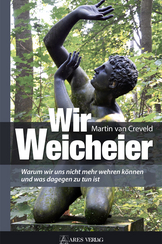PUBLICATIONS
Recommendations
Pussycats
Why The Rest Keeps Beating The Rest, And What Can Be Done About It
We are wimps
Why we can no longer defend ourselves and what to do about it
Prof. Martin van Creveld, 2nd edition, 224 pages, hardcover, €19.90, ISBN 978-3-902732-67-5
Author Prof. Martin van Creveld about his book
Pussycats: Why The Rest Keeps Beating The Rest, And What Can Be Done About It
Like Hamlet once said, something's rotten in the state. Worldwide, NATO countries account for about 60% of all military expenditure. If you include Australia, the sum is even higher. Never before have armed forces been so well organised, equipped and trained. But since the end of the Korean War in 1953, almost all conflicts have ended in defeats. As has happened in Algeria, Vietnam, Iraq and Afghanistan, among others. And just as it may happen again if Islamic terrorism continues to spread and gain a foothold in Europe.
What went wrong? How did the tough soldiers who overcame all natural and human obstacles between 1492 and 1914 and conquered practically the whole world become wimps? This book tries to answer this question. The first chapter focuses on the way in which our Western civilisation deals with its shrinking number of descendants. They are infantilised and deprived of any kind of independence. To express this in a quote from American bestselling author William Deresiewicz, they are transformed into “excellent sheep”. The second chapter shows how these same problems have plagued the military and transformed it into a kind of nursery in many ways. The third chapter explains how the progressive feminisation of the troops reduces and destroys their combat strength. The fourth chapter shows how soldiers involved in today's war are virtually forced to suffer from post-traumatic stress disorders. Finally, the fifth chapter describes the rise of the so-called "society of rights", which offers little room for "duty" and frowns upon every kind of struggle in principle.
The book is written simply and fluently. Anyone who is concerned about the future and the salvation of Western civilisation should read it.
The author:
Martin van Creveld is one of the most important military historians in the western world. He is a Professor Emeritus of History at the Hebrew University of Jerusalem. His most recent publications by Ares Publisher: “Combat Strength. Military Performance and Organisation of the German and American Armed Forces 1939-1945", 5th edition, Graz 2016, and: “War culture. Why we fight: The deep roots of armed conflicts”, Graz 2011.
Inside Islam
What is preached in Germany's mosques
Inside Islam
What is preached in Germany's mosques
Publisher Econ 2017, 253 pages, ISBN 978-3-430-20218-3, €18
More than four million Muslims live in Germany. The weekly visit to the mosque is a matter of course for many of them, every Friday thousands of imams preach in full houses of prayer. We do not even know exactly how many places of prayer there are in this country. Even finding them is often a challenge.
Review:
The intention of this book is to provide insight into some of the sermons that have taken place in thirteen mosques in German cities such as Berlin, Hamburg or Karlsruhe, etc., arbitrarily selected by the author Constantin Schreiber. It is a gloomy book, one that should definitely be addressed in the integration debate in Germany and Austria.
Many of us know or think we know what a mosque is. But is it a place of worship, like a church, or is it a political meeting-place? Some interested people may already have visited a mosque on an open day, and been instructed on the purpose of an Islamic house of prayer. However, very few people know what is said during Friday prayers, as the preachers or imams speak in their national languages in the vast majority of cases.
Fluent Arabic-speaking author, moderator and former media officer in the German Foreign Ministry puts an end to the many speculations about the content of Friday sermons by going into the heart of the mosque. He places his visits in a temporal context and then has the sermons analysed by experts. He also tries to discuss the voiced statements with the imams, which frequently does not succeed because many deny them, while others, even after four years in Germany for example, (page 78), hardly speak any German.
According to Middle East expert Schreiber, at issue here is not “a representative survey, but a report" (page 233). His visits took place in the mosques of Shiite or Sunni communities, where the sermons were held in either Arabic or Turkish. Schreiber visited the mosques with an open mind. If he did not announce his arrival then after the end of the sermon at the latest he wondered why he was never asked “what [he] wanted there” (page 235). Suspicion often only arose when he returned to try to talk to the imams.
Above all, the question of integration was in the foreground during his visits, i.e. whether the content of the sermons - such as the ban on celebrating Christmas - promotes the integration of Muslims in Germany. In view of the large number of Muslims and the increasing number of Muslim refugees in Germany, this question is quite justified. The author's answer is a sobering one, albeit not surprising.
The author's reflection on the complete lack of a discussion on equality between men and women in European society also seems interesting. Likewise, the relationship of Muslims to representatives of other religions, especially Christians, was not addressed in any sermon, despite a host society (still) shaped by Christianity.
Schreiber's conclusion of his eight-month research is therefore:
“At best, the sermons were dense religious texts that hold the listeners in another world; at worst, life in Germany, democracy and our society were rejected. I would like to give a positive example, a sermon that radiates cosmopolitanism, a bridge to life in Germany. Unfortunately, my mosque visits did not provide such an example (page 245).”
In this otherwise very informative and eye-opening book, a more detailed examination of certain Islamic terms would have been useful in some places for a better understanding of Islam. For example, one preacher said, "God calls upon us not to cause unrest on earth.” (page 117). The experts should have explained this statement more precisely, as well as the Jinns (non-Islamic spirits) mentioned in this sermon - using Suras 2:11 and 5:33 (in context with 5:32) in the Quran. The first sura speaks of “depravity on earth”, the latter explaining what is understood by “stir depravity”, namely “wage war against God and His Messenger”, meaning “hostile opposition” to Islam and its ethical commandments. Moreover, the statement “not to cause unrest on Earth” is important since another imam mentioned “to be killed without a legitimate reason” (page 135), which unfortunately was not discussed either. One should learn, however, that the consequence for people who cause destruction is their killing, crucifixion, mutilation of hands and feet, or expulsion.
The Islamic scholars and experts consulted by Schreiber were mentioned by name in the appendix, but unfortunately not with their references, which could certainly have given the explanations more weight. The notes in the appendix, in which Islamic terms and the content of the sermons are explained in detail by the translator, are extremely positive on the other hand, and above all, comprehensible for laymen.
Conclusion:
This is an important book of our time because it gives insight into the thoughts of some imams preaching in Germany. The secondary title of the book could also have been “What is preached in German and Austrian mosques”, since the research results would also be representative for Austria. In any case, it is alarming that not a word of regret is said in the sermons about the victims of the terrorist attacks; it is alarming that integration is not called for; and it is alarming that the authorities are not aware of all this. Or is it?
Readability: ****
Comprehensibility: ****
Explosiveness/tension: ****
Argumentation benefit: ****
Focus on Traiskirchen
Report from within the asylum system
Focus on Traiskirchen
Report from within the asylum system
Publisher edition a, 261 pages, ISBN 978-3-990001-217-8, €21.90
“There was a week in which we had to dispose of fifty tonnes of voluntary donations. The refugees didn't want any more clothes or food because they already had enough.” Franz Schabhüttl, 26 years in the Traiskirchen refugee camp and 13 years its director, does not submit a statement of accounts upon his retirement. Rather, he provides information on what really happens in the asylum system away from the media and the non-governmental organisations. The top official of the Ministry of the Interior paints a multi-faceted picture of state refugee work that the public has never seen before. An illuminating book about everyday life in the asylum system, politicians who misuse it as a tool for their own party politics, and the real downsides of migration.
Review:
After a predominantly icy silence about the so-called refugee crisis, informative books are now thankfully conquering the market. One of the most important new publications on the Austrian book market is undoubtedly the book presented by the now retired director of the Traiskirchen refugee camp. Like no other place, Traiskirchen stands as a synonym for escape, refugees and - as conveyed by the media - for misery and need; that this is far from reality is presented by Franz Schabhüttl and his co-author Andreas Wetz in an impressive and unemotional way.
In the foreword, the author stresses that for him “the problem is not asylum seekers who fall into crime, but full-time criminals who deliberately abuse asylum for their own purposes” (page 10 f.). He sees it as the task of the state to find out who is a legitimate asylum seeker as quickly as possible. It is precisely this failure on the part of the state, that the borders were left open despite the imminent flows of people, which is becoming increasingly unacceptable for the population.
Schabhüttl's statement that his work and actions were solely based on laws applicable in Austria (cf. page 10) seems to be honourable. Here, Schabhüttl is to be sympathised with because the onslaught from 2015, which he had to manage in the Traiskirchen camp, was based on a massive violation of the law by the government in keeping the borders open without any immigration control. Schabhüttl therefore had to manage this breach on the basis of laws that were applicable but de facto repealed. A madness that taxpayers and voters and their descendants will still have to deal with for many decades to come. It is to his credit not to have participated in this breach of law, but to have acted strictly in accordance with it, and there is nothing to blame him for in this respect; indeed, according to his descriptions, we should even be grateful for his steadfastness.
Schabhüttl had a hard time during his time as head of the so-called "Bundesbetreuungsstelle Traiskirchen", as the refugee camp is officially called in German. He found himself in a minefield of politicians, the media, NGOs with their own agenda and private individuals, who all thought they were doing good for the people in Traiskirchen. However, this often went wrong and resulted in high additional costs for taxpayers or enormous amounts of waste, which rose to 145 tonnes in September 2015 - the peak of the refugee crisis - due to false reports by NGOs pursuing their own agenda, such as Caritas or the Red Cross. This impressive number included 95% voluntary donations of food and clothing; Schabhüttl explains: “The refugees didn't want any more clothes or food because they already had enough.” (page 203). Many helpful citizens “donated used and bought new goods” (page 204), with the donated goods on site. The supposed undersupply of refugees exaggerated in the media was used by the NGOs to create a certain mood among the population, something that these NGOs in particular accuse others of, such as the FPÖ.
In his “Report from Within the Asylum System”, Schabhüttl does not cut corners with criticism of the various parties involved, such as mayors, interior ministers, “non-profit organisations” and NGOs, including, above all, Amnesty International and Caritas. Some of what he talks about had already made its way into the public domain, but the view of the head of the first reception centre was often lacking due to ministerial muzzles (cf. page 138). This book now makes the missing page accessible, describing for example that the work of the refugee commissioner installed by the government, former Raiffeisen Advocate General Christian Konrad, was represented completely differently in the media than evidently perceived on site in Traiskirchen.
Schabhüttl is also tough on the media. He “had everyone” (page 253), he gave hundreds of interviews, showed transparency, yet he often had a “light-bulb experience” when "his" interview, which he had never given, appeared in a newspaper. Journalists illegally entering the camp also pose a major problem for him, especially since their reports provided a distorted picture for the public; according to Schabhüttl for example, the refugees were not sitting “persevering and neglected” on the ground, as reported by the media, but were “waiting for lunch to be served” (page 258)
Conclusion:
A book that should be read by all interested parties, including those who are critical of Traiskirchen as an asylum centre or are often vilified as do-gooders. This book also clearly shows the ambiguous role of the media and NGOs. It is thanks to Franz Schabhüttl that the public now has the opportunity to form its own opinion outside the mainstream media, by courageously and honestly trying, together with his co-author, to present his view of what happened during his time in the Traiskirchen refugee camp.
FPÖ Education Institute rating:
Readability: ****
Comprehensibility: ****
Explosiveness/tension: ****
Argumentation benefit: ****
A MIGRATION OF PEOPLES
BRIEF COMMENTARY ON THE CURRENT MIGRATION CRISIS
A MIGRATION OF PEOPLES
BRIEF COMMENTARY ON THE CURRENT MIGRATION CRISIS
Manuscriptum Publishing House; 1st edition, p. 96, ISBN-10: 3944872304, approx. €12.80
"Václav Klaus has always been one of Europe's most exceptional statesmen. His assessment of the migration crisis in Europe, which he calls a 'migration of peoples', requires less than 100 pages gathered in a slim tome. But those pages pack a punch."
Review:
Over a million migrants came to Germany alone in 2015. Millions more are on their way to Europe. The irresponsibility of European politicians, led by Angela Merkel, is adding further fuel to this new migration of peoples. Rather than protecting the natural interests of sovereign nation-states, the German chancellor is promoting a reckless rush to welcome the newcomers. Meanwhile, cities and towns are struggling to manage the chaos. Citizens are turning their backs on their political representatives, and the hegemony of German sentimentalists is destroying peace in Europe.
Brussels is already threatening sanctions for Central and Eastern European states that protest this situation. Against all that, one of Europe's most exceptional statesmen rises to speak his mind. Václav Klaus, the long-time president of the Czech Republic, argues that it is time to say goodbye to compassionate daydreams. He accuses European ruling elites of destroying what remains of national statehood in Europe under the pressure of the masses of refugees. Klaus fears for Europe's future.
VÁCLAV KLAUS, born in 1941, one of the most exceptional figures in recent Czech politics, served as President of the Czech Republic from 2003 to 2013As a political commentator, Klaus and his clearly-defined positions contribute an essential voice to European debates.
JIŘÍ WEIGL, born in 1958, is Executive Director of the Václav Klaus Institute in Prague. Weigl headed up the Office of the President from 2003 to 2013. A respected economist and Arabist, he is the author of multiple academic books and numerous articles on political, economic and historical topics.



